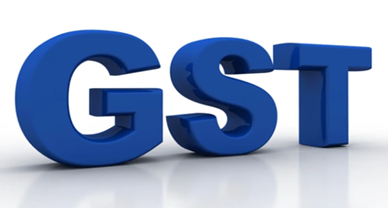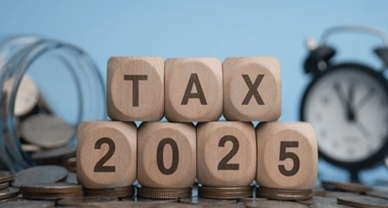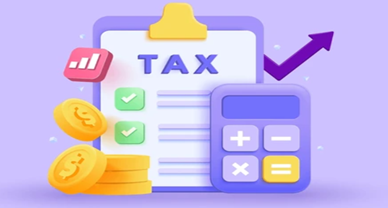Pay To Play: GST Outweighs Online Gaming
Online Gaming and Levy of GST
In past few years, India’s gaming industry has seen a massive growth and evolution. The nation’s vast population, coupled with the widespread accessibility of smartphones, ease of transactions, and better connectivity, has played a major role in boosting the popularity of online gaming across all age groups. “The online gaming industry in India has seen a rapid expansion of 28% CAGR between FY20 and FY23. Projections indicate further growth to ₹33,243 crore by FY28, with a sustained 15% CAGR.”[1] At the moment, India is the biggest gaming market. However, the introduction of two new provisions (Section 115 BBJ and Section 194 BA) in the Income Tax Act of 1961 by the Finance Bill, 2023, last year, weighed down the industry’s expansion. These sections were added to levy tax @30% on income from “any online games”. Moreover, the previous threshold of INR 10,000 to trigger the tax was removed. Therefore, TDS will be deducted even in case of withdrawal by players generating miniscule income from such games.
The online gaming industry faced severe setbacks following the decisions made at the 50th and 51st GST Council meetings, where the council approved recommendations to tax online gaming. Now, from 1st October 2023, the highest tax slab of 28% GST will be levied by the online gaming companies “on the actual cash or equivalent deposits made by players on an online platform to commence a game and not on the winning amounts redeployed. The Council has decided to tax all online gaming activities irrespective of whether such activities are a game of chance on skill. Both types of online games will be treated at par for tax purposes.”[2] This decision is not viable as the industry will be compelled to shift the GST burden onto users, who are already subject to a 30% income tax on their winnings from various online gaming platforms. High tax rates would probably deter gamers from joining, which might be disastrous for the gaming industry.
GST Applicability on Online Gaming: Skill vs. Chance:
“Earlier gambling activities such as betting and casino games attracted a 28 percent GST rate, skill-based games were taxed at a lower 18 percent rate.”[3]. With the tightening of GST laws on online gaming, these regulations will now be enforced on games of skill in the same way as games of chance and GST will be levied @28%. “By including every single activity within the purview of GST, it virtually amounts to banning any form of gambling be it a game of skill or game of chance since there is no provision whatsoever distinguishing the two concepts, and it is entirely left open to judicial interpretation.”[4]
Courts have repeatedly set out standards in various legal precedents to determine whether a game is predominantly one of skill or chance. In the case of Dr. K.B. Lakshmanan v. State of Tamil Nadu, Supreme court held that, “Games of chance rely entirely or partially on luck. In these games, the outcome is completely uncertain and unpredictable. Games of skill, on the other hand, still involve an element of chance but success depends mainly on the player’s knowledge, experience, and abilities.”[5]
Similarly, in Varun Gumber v. Union Territory of Chandigarh, fantasy games such as Dream 11 was not considered to be a game of chance and fall under the ambit of the Public Gambling Act of 1867 since “success in Dream 11’s fantasy sports basically arises out of user’s exercise, superior knowledge, judgment and attention.”[6] Users must evaluate the strengths and weaknesses of all available players and consider various factors affecting game conditions before forming their virtual team, a process that undeniably requires skill and discretion.
In the case of State of Andhra Pradesh v. K. Satyanarayana, the honourable court considered the question of whether the game of Rummy was a game of chance or skill and held that, “Rummy requires considerable skill in holding and discarding cards. We cannot, therefore, say that the game of rummy is a game of entire chance. It is mainly and preponderantly a game of skill”[7].
In the recent case of Gameskraft Technologies Private Limited v. Directorate General of Goods and Service Tax Intelligence & Others, the Karnataka High court reiterated that, “Rummy is substantially and preponderantly a game of skill and not of chance and it does not amount to gambling”[8]. However, the Supreme Court’s intervention and stay on the Karnataka High Court’s judgment have raised doubts about whether games of skill can still be classified as gambling or betting and thus be taxed under the CGST Act just like game of chance.
Despite the established precedents distinguishing skill from chance, confusion and controversy persist when these terms are used interchangeably. This ambiguity leads to uncertainty about whether predominantly skill-based games fall under the scope of GST.
Call for the Revival of the Previous Practice of Taxing Gross Gaming Revenue (GGR):
“Earlier 18% tax on GGR was fixed by the government, where the gamers used to pay it as platform fee. However, the government now has decided to tax 28% on the face value.”[9] This basically implies that instead of taxing the GGR, tax will be assessed on the total pot value each time a player puts a wager to play the game. To comprehend the distinction between the present and previous tax regimes, let us examine an example whereby a player deposits and wagers INR 10,000 with an online gaming intermediary, considering INR 100 as platform charge. Under the past regime, the player paid 18% GST on the platform fee, which was INR 18 (18% of 100). Now, with the new tax regime, the player must pay 28% GST on the entire bet amount, which comes to INR 2,800 (28% of 10,000). “This results in additional tax liability on account of two factors – firstly, the increase in the actual value of tax, i.e., 18% to 28%, and secondly, the taxing of a larger amount, i.e., the pot value as opposed to the GGR.”[10] The burden to pay the taxes will be excessively shifted to the users. Given that the users already must pay 30% income tax on their net earnings, they will be disincentivised to pay GST on the entire value of each wager. The entry and exit load will leave users with little to nothing. Additionally, gaming intermediaries may be forced to shut down or discontinue operations if they bear the tax liability, as the platform fee collected will not cover the GST payable.
Uncertainty Surrounding Retrospective Application of Tax Demands:
GST Council introduced the tax model of levying 28% GST on full face value with effect from 1st October 2023. However, the retrospective application of this tax has caused significant upheaval in the industry. “The heavy demand notices issued to all the players in the industry for the pre-amendment period due to virtue of retrospective application is the main concern of the industry. The notices are more than 10 times the turnover of the platform in some cases.”[11] The significant tax demands from authorities for periods prior to the amendment will exhaust these companies’ resources, potentially forcing them to shut down. The authority’s unclear stance is evident, as the GST Council meeting, while notifying the 28% GST on online gaming, did not address the issue of retrospective applicability. “Various central and state tax authorities have issued 71 demand notices to the industry where 1.12 lakh crore has been demanded on the ground that the tax levy on online gaming at 28% is applicable from July 2017 when GST was introduced and not from October 2023 from when the amendments to the GST Acts were brought into effect.”[12] Despite the acceptance of the revised tax by the industry, this oversight has led to needless litigation.
Fate of the Industry:
The new tax adjustments have been poorly received by users and gaming intermediaries. As a result, many players are turning to illegal offshore gaming platforms that offer better returns and allow them to evade taxes. Under the new amendments, foreign online money gaming companies (FOMGCs) operating in India are now required to register for GST. “However, no overseas online gaming company has registered in the country since October 2023.These overseas companies keep changing their VPNs and change their websites when they are blocked.”[13] As a result, cross-border collaboration between Indian gaming companies and international partners has become impossible.
Gaming startups in India provide numerous employment opportunities and are expected to generate even more in the future. However, due to the significant increase in tax demands, these startups are being forced to lay off employees to allocate their earnings towards tax payments. “The first casualty to the move was witnessed within a week of the GST Council’s decision wherein Mobile Premier League (MPL) had decided to lay off 350 employees as a measure for survival owing to the 300%-400% increase in taxation. This was followed by Spartan Poker and Hike’s Rush Gaming Universe which too undertook similar strategies.”[14]
The introduction of GST, “had a significant impact on the stock market, leading to substantial losses for companies like Nazara Technologies and Delta Corp.”[15] The Indian stock market is hitting unprecedented highs, recently surpassing the 80,000 mark on the Sensex for the first time in history. In contrast, companies in the gaming sector have experienced a continuous decline in share prices since the GST Council’s decision, making it one of the worst-performing sectors. Consequently, investment in the Indian gaming industry has dropped significantly.
In my opinion, the government’s rationale for imposing such heavy taxes is to deter excessive gambling behaviour. However, it is important to recognize that taxes collected from players can be a significant source of revenue for the government. Therefore, efforts should be made to strike a balance between taxation and the promotion of the industry, allowing them to coexist harmoniously. The Council should reconsider its decision to impose 28% GST on the full value of bets and instead calculate it based on Gross Gaming Revenue at a lower rate. They could recommend a stricter taxation approach for users who play frequently or place high stakes. Additionally, to protect vulnerable individuals, the Council could implement entry restrictions to the betting system based on age and income. To curb the addiction in the guise of higher taxation will essentially mean to murder the gaming sector.
Author:–SAJAL SINGH, in case of any queries please contact/write back to us at support@ipandlegalfilings.com or IP & Legal Filing.
[1] Amar Patnaik, ‘Getting to a new level in India’s online gaming sector’ The Hindu (7 May 2024).
[2] Dr. Sanjiv Agarwal, ‘Levy of GST on online gaming – journey from GST council to enactment’ (Tax Management India, 22 August 2023) <https://www.taxmanagementindia.com> accessed 19 July 2024
[3] Meghna Mittal, ‘Online gaming: Understanding the tangled web of taxes’ (Money Control, 29 April 2024) https://www.moneycontrol.com/news/business/economy/online-gaming-understanding-the-tangled-web-of-taxes-12710668.html accessed 22 July 2024
[4] Arjun Gupta, ‘GST: A good & simple tax – Controversial issues and possible solutions’ (itatonline, 10 November 2023) < https://itatonline.org/digest/articles/gst-a-good-simple-tax-controversial-issues-and-possible-solutions/> accessed 23 July 2024
[5] Arjun Maheshwari, ‘Online gaming, casinos and fantasy sports- an overview of gambling laws’ (Manupatra, 25 August 2023) < https://articles.manupatra.com/article-details/ONLINE-GAMING-CASINOS-AND-FANTASY-SPORTS-AN-OVERVIEW-OF-GAMBLING-LAWS> accessed 25 July 2024
[6] Varun Gumber v. UT, Chandigarh, 2017 SCC OnLine P&H 5372
[7] State of A.P. v. K. Satyanarayana, 1967 SCC OnLine SC 333
[8] Gameskraft Technologies v. DGGST, (2023) 116 GSTR 53
[9] Awantika, ‘Impact on Online Gaming Industry after the imposition of 28% GST’ (Taxmann, 8 September 2023) < https://www.taxmann.com/research/gst-new/top-story/105010000000023280/impact-on-online-gaming-industry-after-the-imposition-of-28-gst-experts-opinion> accessed 26 July 2024
[10] Sneha Vaitheeswaran & Vibha Shyam Sekar, ‘taxing online gaming: killing the ‘ace’ of the industry?’ (CTL NALSAR, 16 September 2023) <https://ctl.nalsar.ac.in/2023/09/16/taxing-online-gaming-killing-the-ace-of-the-industry/> accessed 26 July 2024
[11] Parag Rathi & Abhishek Anand, ‘Game of Tax – Direct and Indirect Tax Nuances for the Gaming Industry’ (Taxmann, 13 June 2024) < https://www.taxmann.com/research/income-tax/top-story/105010000000024080/game-of-tax-%E2%80%93-direct-and-indirect-tax-nuances-for-the-gaming-industry-experts-opinion> accessed 27 July 2024
[12] Dr. John Joseph, ‘Retrospective tax demands on online gaming: The need for legal certainty’ (ET Legal World, 12 January 2024) < https://legal.economictimes.indiatimes.com/news/opinions/retrospective-tax-demands-on-online-gaming-the-need-for-legal-certainty/106762191> accessed 27 July 2024
[13] PTI, ‘Monthly GST mop-up from online gaming companies jump 400 pc since October 1’ The Economic Times (2 February 2024)
[14] Atish Chakraborty & Ishaan Vohra, ‘The Casualty of GST on Online Gaming and Potential “Death By A Thousand Cuts” of The Online Gaming Industry’ (Taxmann, 20 September 2023)
<https://www.taxmann.com/research/gst-new/top-story/105010000000023310/the-casualty-of-gst-on-online-gaming-and-potential-death-by-a-thousand-cuts-of-the-online-gaming-industry-experts-opinion> accessed 28 July 2024
[15] Tanushree Jaiswal, ‘GST Council to impose 28% tax on online gaming companies, stocks drop by 10-20%’ (5Paisa, 19 July 2023) <https://www.5paisa.com/news/gst-council-to-impose-28-tax-on-online-gaming-companies-stocks-drop-by-10-20> accessed 28 July 2024



